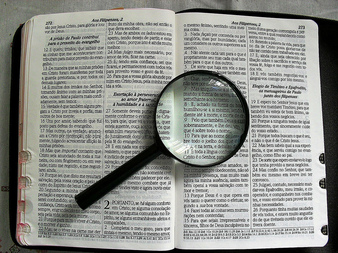
“All Scripture is breathed out by God and profitable for teaching, for reproof, for correction, and for training in righteousness, that the man of God may be complete, equipped for every good work.” (2 Timothy 3:16-17)
In this passage, we see that “All Scripture is breathed out by God,” which means that everything written in the Bible is from God. While He used men to write the words, God was the ultimate Author that gave them the words to write. We also see above “that the man of God may be complete, equipped for every good work.” This implies that we need nothing else to guide us regarding the things of God, because if we did need something else, the “man of God” wouldn't be complete.
“No prophecy of Scripture comes from someone's own interpretation. For no prophecy was ever produced by the will of man, but men spoke from God as they were carried along by the Holy Spirit” (2 Peter 1:20-21).
This section further shows us that the Bible is not just someone’s own ideas, but rather a supernatural work created by God. There are many prophesies in the Scriptures that were foretold and fulfilled hundreds of years later, giving additional credibility to the authority of the Bible. Also, there are no contradictions found in all of Scripture. There may be some hard to understand verses, but all supposed contractions are easily explained by a thorough examination of the Word of God.
“I warn everyone who hears the words of the prophecy of this book: if anyone adds to them, God will add to him the plagues described in this book, and if anyone takes away from the words of the book of this prophecy, God will take away his share in the tree of life and in the holy city, which are described in this book” (Revelation 22:18-19)
While this warning is in the book of Revelation, it’s placement at the end of the whole Bible leads me to believe that this was meant to advise people not to mess with the entire written Word of God. How can we test what is Scriptural and what isn't? Use Scripture! That sounds odd, but if something contradicts what we already know is true from God’s Word, then it is not biblical and should not be given any authority.
Of course, if something DOES line up with Scripture, we still shouldn't add it to the Bible. Partially, because of the warning from Revelation, but also because it isn't really needed since the Word of God has already addressed the issue. Whenever someone offers "new revelation" from God, even if it's not explicitly expressed in the Bible, we should distance ourselves from that person.
"But even if we or an angel from heaven should preach to you a gospel contrary to the one we preached to you, let him be accursed." (Galatians 1:8)
While this isn't an exhaustive explanation for why Scripture is our sole authority on the things of God, it should hopefully give you a better understanding of why we believe in Sola Scriptura… Scripture is our sole authority.
For further study:
http://www.gotquestions.org/sufficiency-of-Scripture.html
http://carm.org/bible-alone-sufficient-spiritual-truth
http://carm.org/are-scriptures-sufficient
 RSS Feed
RSS Feed
